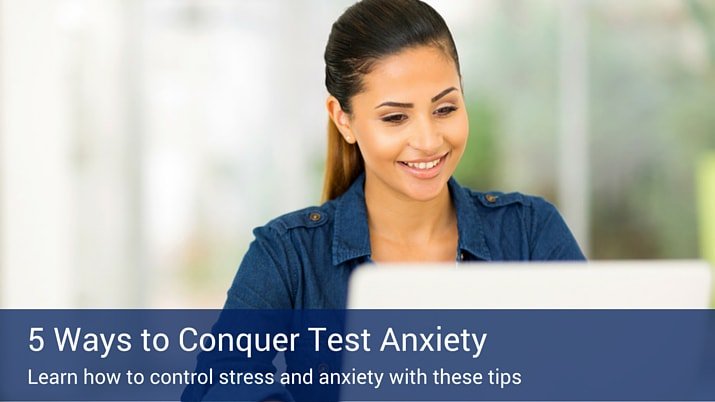5 Ways to Conquer Test Anxiety

Last Updated February 12, 2016
Test anxiety is common among students these days, and it’s no wonder. Success in some programs hinges on one or two exams over the course of a semester. That type of pressure can be crippling, especially if the test taker has a history of exam-related anxiety.
That level of stress can take control of people and sabotage their efforts in school, but worse, it can be harmful to their health as well as their grades.
The Effects of Anxiety
Anxiety, at its worst, can have a real effect on your mind and body. Short term effects can range from irritability and nausea to dizziness and rapid heartbeat. Sufferers typically struggle to concentrate, which can increase anxiety during a test and worsen other symptoms.
Long term effects can have more dangerous implications. People who are consistently stressed can experience detrimental issues like insomnia, memory problems and increased risk of stroke. Studies have found that people with anxiety disorders had a lower quality of overall health.
Fortunately, there’s good news: if the anxiety problem was solved, those same people could experience substantial improvements to health and wellness.
How to Reduce Test Anxiety
- Breathe – It sounds simple, but steady breathing can help relax muscles and focus your mind. It is likely the easiest thing you can do to combat anxiety. Shut your eyes, take in a lungful of air, pause for a brief moment and exhale steadily. Repeat that three times, or as needed, to help clear your head before a test.
- Be comfortable – Make sure you’re in comfortable clothes and in a relaxing environment. Online testers should find a spot with the fewest distractions. Pinpoint the location that makes you most comfortable and work from there.
- Eat something (healthy) – Don’t take a test on an empty stomach, but also be careful not to eat the wrong foods before an exam. Avoid processed or fried foods, and things like flour products or red meats. Sugar can oftentimes increase anxiety, so skip soft drinks and candy. Instead, opt for fresh fruits or vegetables.
- Practice positive reinforcement – Don’t discourage yourself. Test anxiety is a manifestation of your desire to succeed, and you can manage it by reassuring yourself that you’re doing the best that you can possibly do.
- Be confident – Your confidence should be built on a foundation of preparedness. In the days and hours leading up to the test, allow yourself the time and effort required to prepare. Gather all necessary materials, review all testable curriculum and enter the exam with the supreme confidence that you have what it takes to pass.
You’re not alone. Most students feel some measure of stress and anxiety before a major test, but it doesn’t have to be overwhelming. Test anxiety can be fought and overcome with the five strategies detailed above: remember to breathe, make yourself comfortable, eat right, do your best and be confident.
Control your anxiety. Don’t let it control you.





